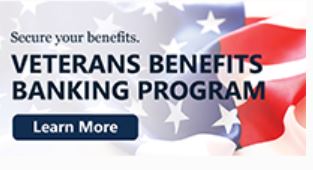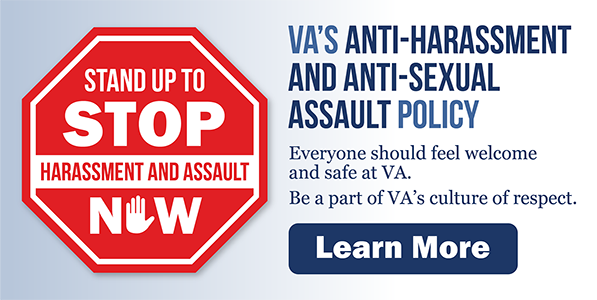Attention A T users. To access the menus on this page please perform the following steps.
1. Please switch auto forms mode to off.
2. Hit enter to expand a main menu option (Health, Benefits, etc).
3. To enter and activate the submenu links, hit the down arrow.
You will now be able to tab or arrow up or down through the submenu options to access/activate the submenu links.
Locator
Contact
Search
Isakson and Roe Act Summaries
The Isakson and Roe Act enhances and expands education benefits and programs for Veterans, Service members, families and survivors. Check out the descriptions below to understand how the provisions impact GI Bill® and Veteran Readiness and Employment (VR&E) benefits.
The Responsible Education Mitigating Options and Technical Extensions (REMOTE) Act extended expiring COVID-19 protections for educational benefits and modified certain requirements of educational institutions, including provisions from the Isakson and Roe Act.
Isackson and Roe Act
Effective January 5, 2021
Debt Repayment and Waivers:
Overpayments to eligible persons or Veterans (Section 1019)
Requires schools and training programs, instead of the student, to be financially responsible for any overpayment of education-related benefits paid directly to the educational institution.
This applies to tuition and fee payments and Yellow Ribbon Program payments under the Post-9/11 GI Bill (including under the Edith Nourse Rogers STEM Scholarship) and to advance payment of benefits under the various GI Bill programs.
Restoration and Expansion of Entitlement:
Restoration of entitlement to Chapter 31 for Veterans affected by school closure or disapproval (Section 1007)
Provides restoration of benefits for participants in a VR&E program under Chapter 31 in the event of a closure of an educational institution, to provide parity between these individuals and individuals who are provided this restoration under the Post-9/11 GI Bill.
Expansion of Transfer of Entitlement for Dependents under the Post-9/11 GI Bill (Section 1011)
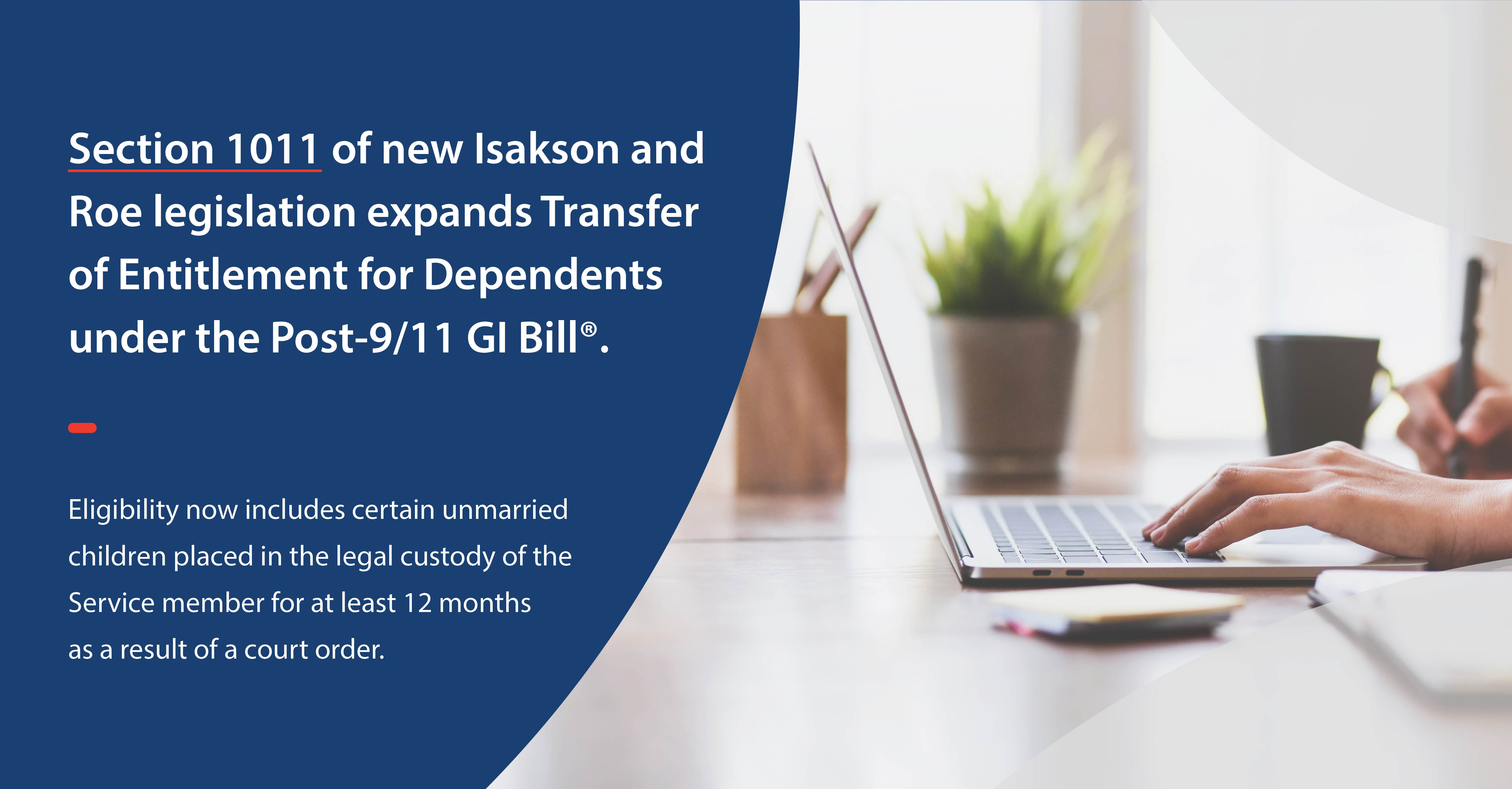
Expands the eligibility for dependents to whom Post-9/11 GI Bill benefits can be transferred. Eligibility now includes certain unmarried children placed in the legal custody of the Service member for at least 12 months as a result of a court order.
Program Expansion/Enhancements:
Improvements to Edith Nourse Rogers STEM Scholarship program (Section 1001)
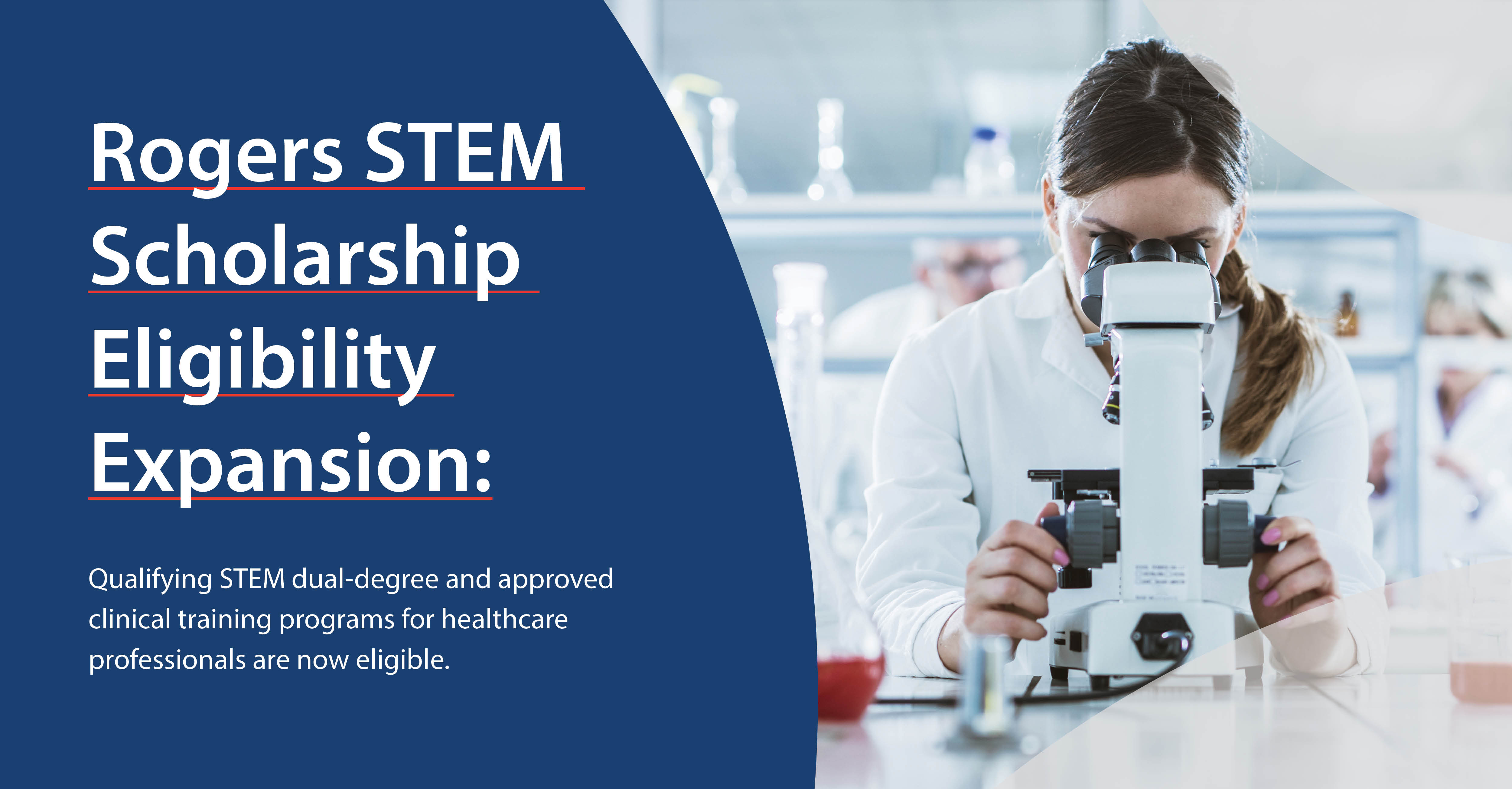
Expands eligibility under the Edith Nourse Rogers STEM Scholarship program to allow scholarships for:
● Students enrolled in dual secondary degrees, when one of the programs meets the program criteria.
● Health care professionals completing clinical training to become licensed to practice in a state or locality.
Ensures the Rogers STEM Scholarship program is not subject to the 48-month entitlement limitation on aggregate benefits (using Chapter 33 benefits in conjunction with Chapters 30 and 1606) or the 81-month entitlement limitation (Chapter 35). For more information on the program, visit the Edith Nourse Rogers STEM Scholarship web page.
Eligibility for participation in Yellow Ribbon Program (Section 1008)
Terminology has been updated to provide consistency across other sections of law. The Yellow Ribbon Program can help you pay for higher out-of-state, private school, or graduate school tuition that the Post-9/11 GI Bill doesn’t cover. To find out if your school participates in the Yellow Ribbon Program, you can use our tool to find a Yellow Ribbon school and visit our Yellow Ribbon web page for additional information. As a result of this update, some foreign schools will be eligible to participate in the Yellow Ribbon Program for the 2021-2022 academic year.
Expansion of VET TEC Program (Section 4302)
Expands Veteran Employment through Technology Education Courses (VET TEC) pilot program eligibility to include transitioning Service members within 180 days of their separation. Additionally, it increases the annual funding for the program from $15M to $45M, due to the high demand and usage of the program. Learn more about the program and your eligibility.
Institutional Updates
VA treatment of for-profit educational institutions that convert to nonprofit (Section 1022)
Institutions that convert from a for-profit education institution to a nonprofit are required to receive annual risk-based surveys for a period of three years after the conversion.
Authority for State Approving Agencies (SAAs) to conduct outreach activities (Section 1023)
Codifies that SAAs can conduct outreach activities. SAAs are already authorized to conduct these activities and routinely do so.
Effective July 4, 2021
General Updates and Clarifications
Limitations on collocation (Section 1024)
SAAs may not be located within a university or university system whose courses or programs of education are subject to their approval, in order to prevent any conflicts of interest.
Effective August 1, 2021
Program Expansion/Enhancements
Eligibility for Fry Scholarships (Section 1002)
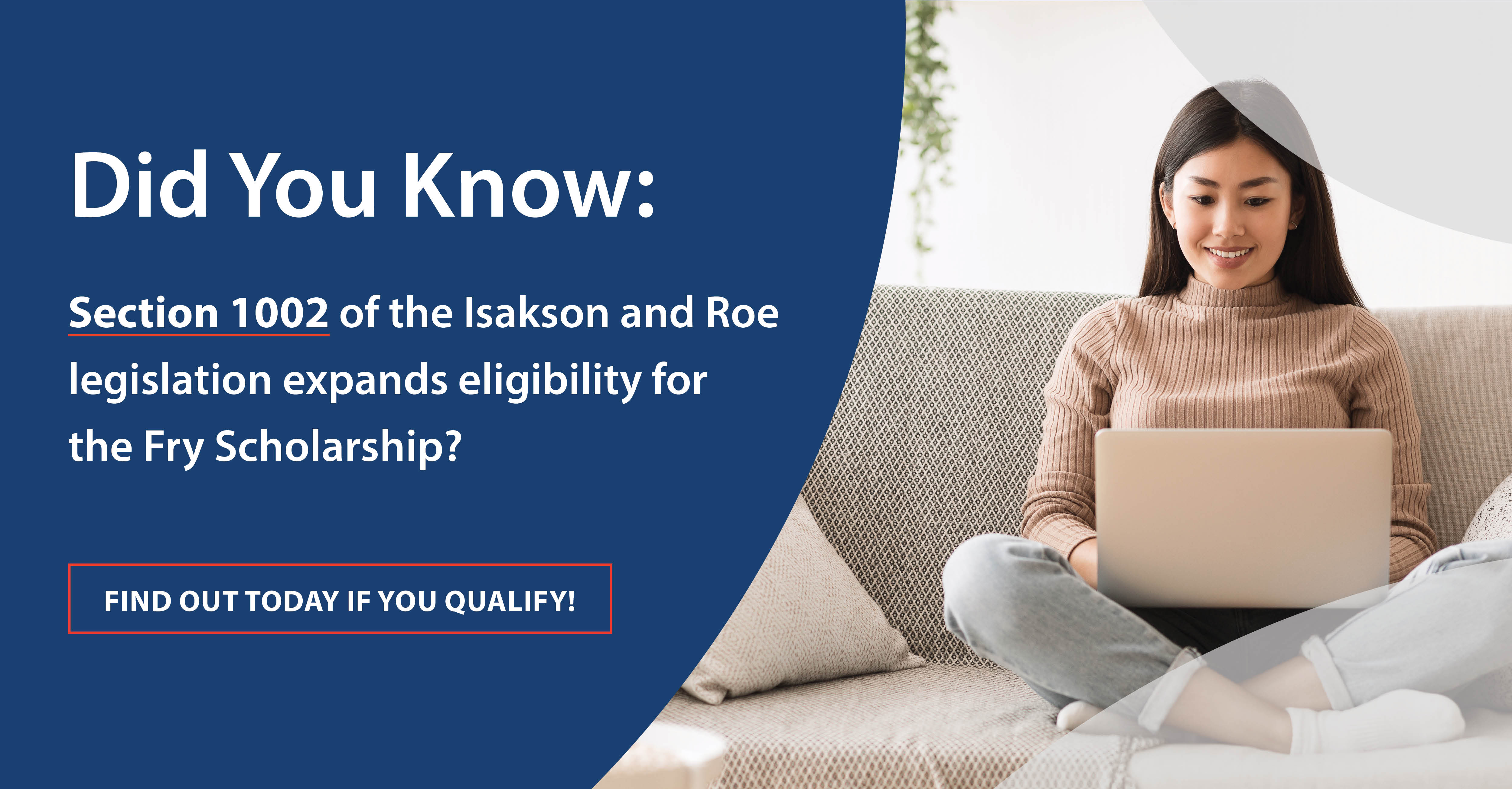
Expands eligibility for the Fry Scholarship to include those whose parent or spouse died on or after September 11, 2001:
● While serving on duty other than active duty as a member of the Armed Forces, or
● From a service-connected disability while a member of the Selected Reserve.
Outreach services provided through congressional offices included in Work Study activities (Section 1006)
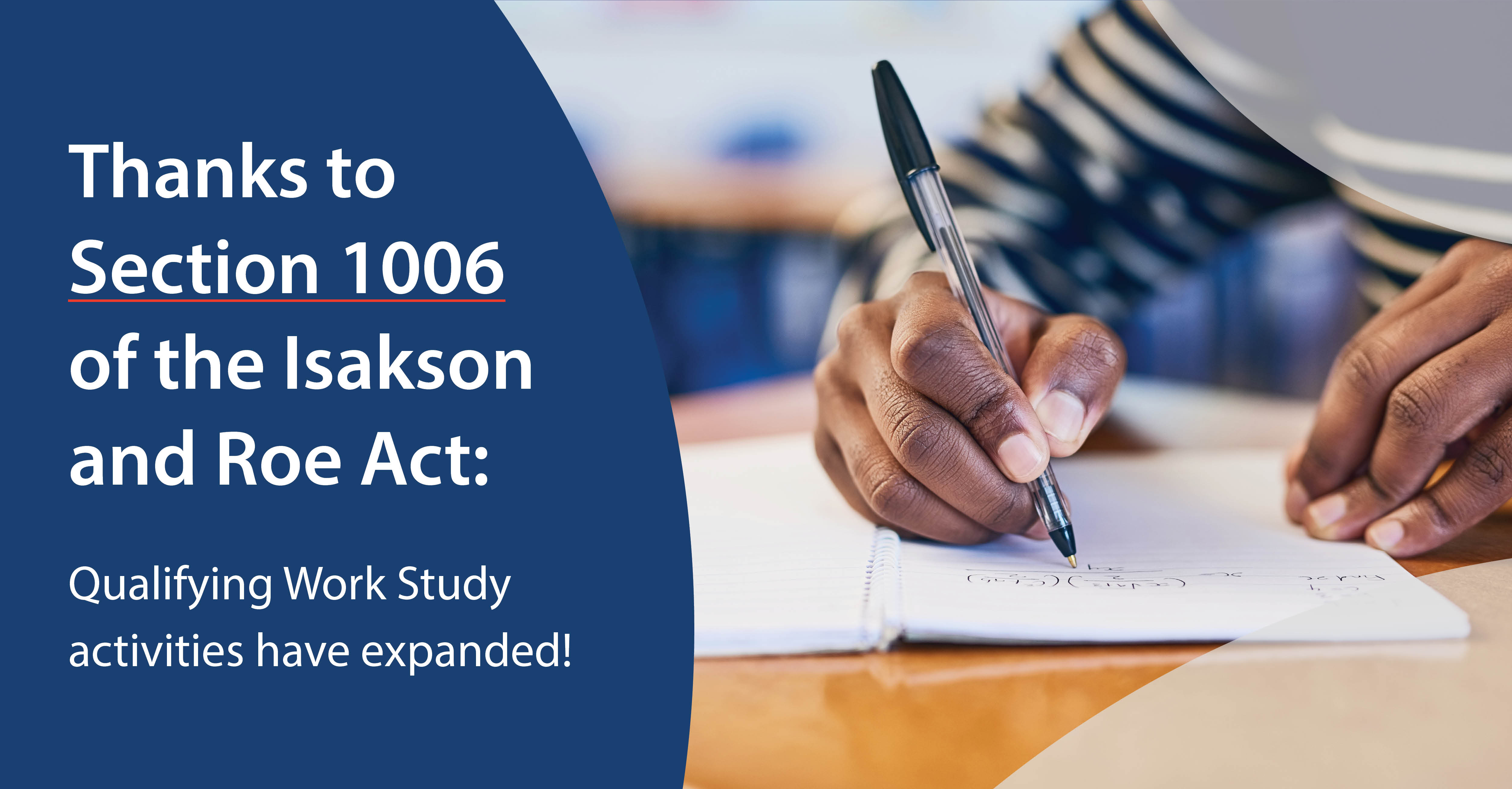
Students who work in congressional offices may now qualify for Work Study allowances if certain outreach activities are performed, such as distributing information to members of the Armed Forces, Veterans, and their dependents about government benefits and services.
Educational assistance for individuals who do not transfer credits from closed or disapproved programs of education (Section 1021)
Students whose schools were closed or disapproved and were unable to transfer at least 12 credits to a new school, may still receive a restoration of GI Bill entitlements for their entire program of education. This applies to VR&E beneficiaries as well.
Note: This restoration of entitlement is only available to beneficiaries whose schools closed or had programs disapproved after August 1, 2021, but before September 30, 2023.
General Updates and Clarifications
Requirements for in-State tuition (Section 1005)
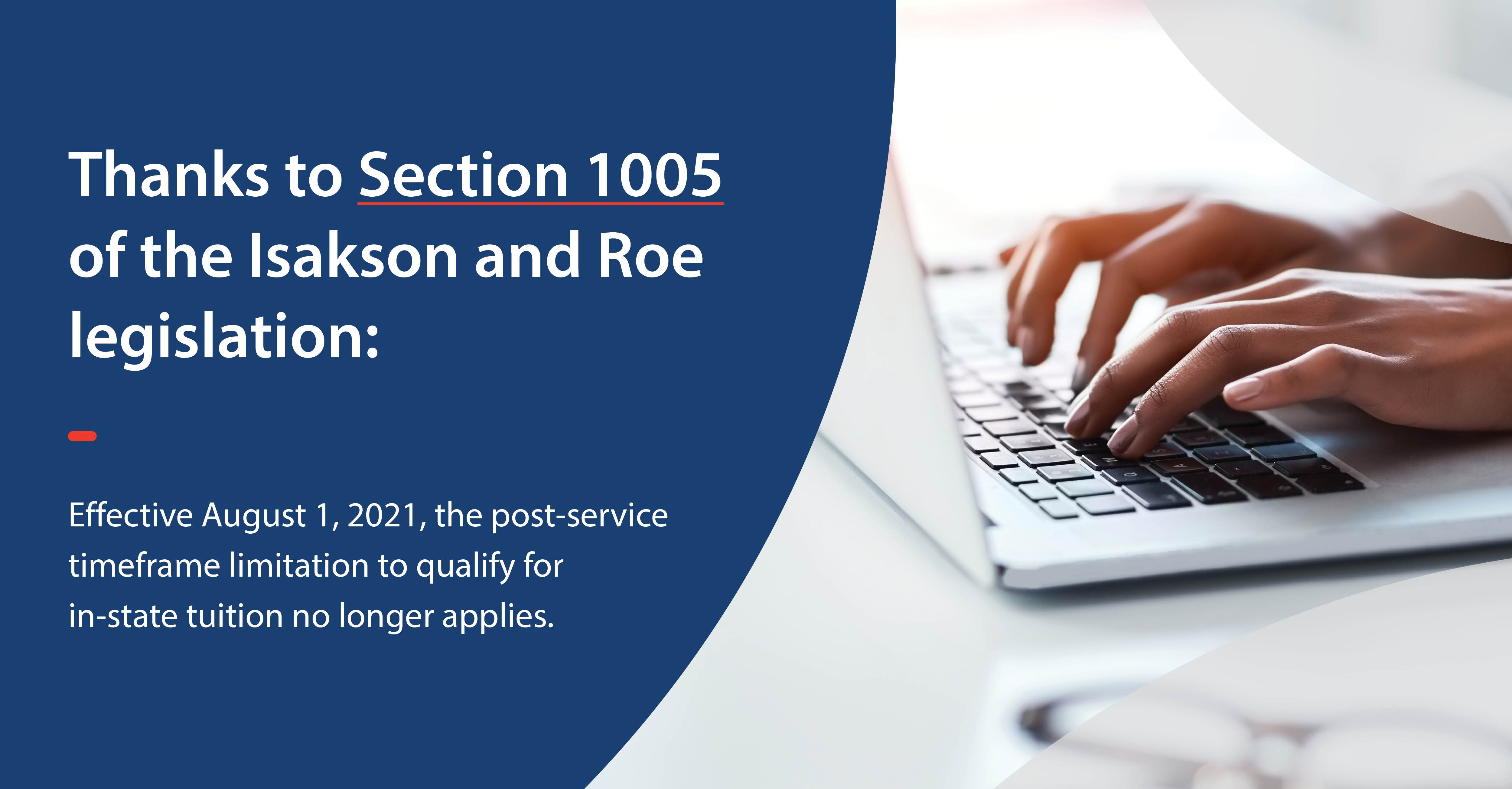
Post-9/11 GI Bill, Montgomery GI Bill-Active Duty, and VR&E beneficiaries are no longer required to enroll at a public institution of higher learning within a three-year period after leaving the service in order to benefit from in-state tuition and fees. The VA website will feature a database with information on any public institution’s requirements to receive in-state tuition.
Verification of enrollment to receive benefits (Section 1010)
Requires students to verify their enrollment at school on a monthly basis in order to continue receiving their Post-9/11 GI Bill monthly housing allowance (MHA). Schools will also be required to certify the student’s enrollment after the add-drop date.
If a student fails to verify their enrollment status for two consecutive months, VA will withhold MHA payments until the student has verified their enrollment.
Learn more about the monthly enrollment verification requirement.
Institutional Updates
Expansion of reasons for which a course of education may be disapproved (Section 1012)
Explains that a school that is at risk of losing accreditation would no longer be approved to receive Post-9/11 GI Bill funds.
Oversight of educational institutions subject to Government action (Section 1014)
Requires the Secretary of Veterans Affairs to provide SAAs with notice of any punitive actions being taken against an educational institution. SAAs will then be required to conduct a risk-based survey and if necessary, take additional punitive action against the institution. If any actions are taken against an institution, SAAs are required to provide VA and other SAAs with notice.
Additional requirement for approval of educational institutions (Section 1015)
Requires institutions to be eligible for participation in the Federal Student Aid program through Title IV of the Higher Education Act in order to be eligible to receive GI Bill funds. A Title IV school is an institution that processes U.S. federal student aid.
Accreditation for law schools (Section 1016)
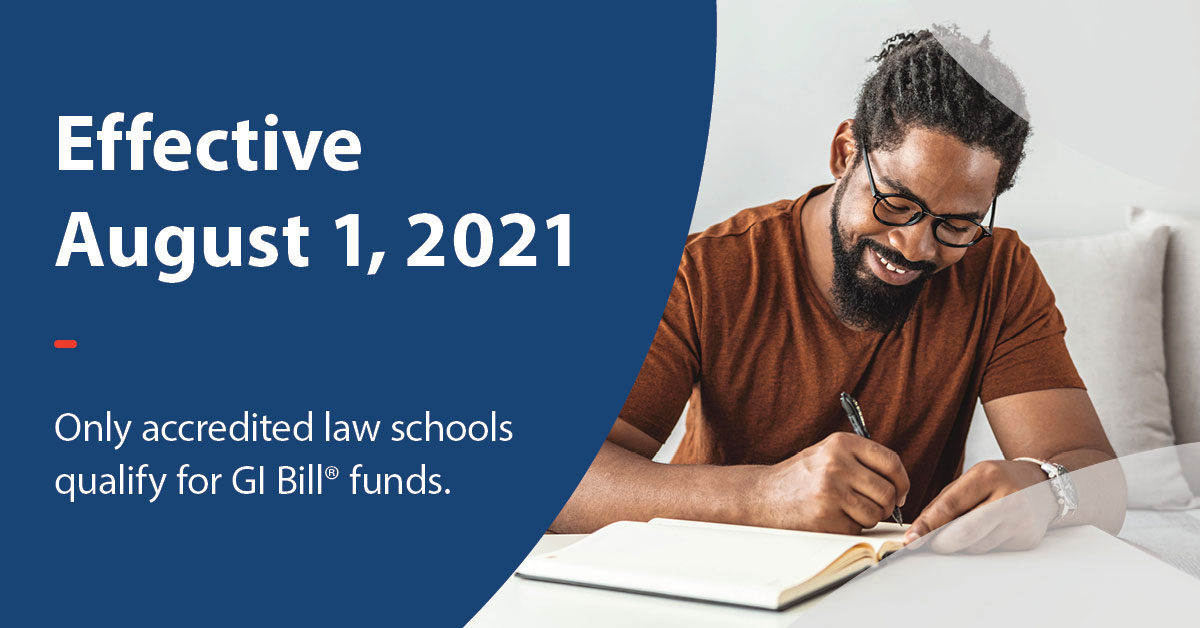
Clarifies that law schools must be accredited by a specialized accrediting agency in order to qualify for GI Bill funds. Currently, only the American Bar Association can provide accreditation for legal education.
If a school is unaccredited, students will be unable to utilize GI Bill funds at the institution.
Grounds for disapproval of a course: risk-based surveys (Section 1017)
Allows for a course to be disapproved if the institution does not comply with a risk-based survey by an SAA.
Requirements for educational institutions (Section 1018)
Adds requirements for schools to provide students with certain financial information and other requirements. Schools must comply with the requirements in order to qualify for GI Bill funds. This requirement also applies to VR&E beneficiaries. Changes made by the REMOTE Act now exempt certain schools from this section (see Section 3b of the REMOTE Act at the bottom of this page for more details). This provision goes into effect on June 15, 2022 and applies to educational institutions beginning August 1, 2022.
Limitations on certain advertising, sales, and enrollment practices (Section 1020)
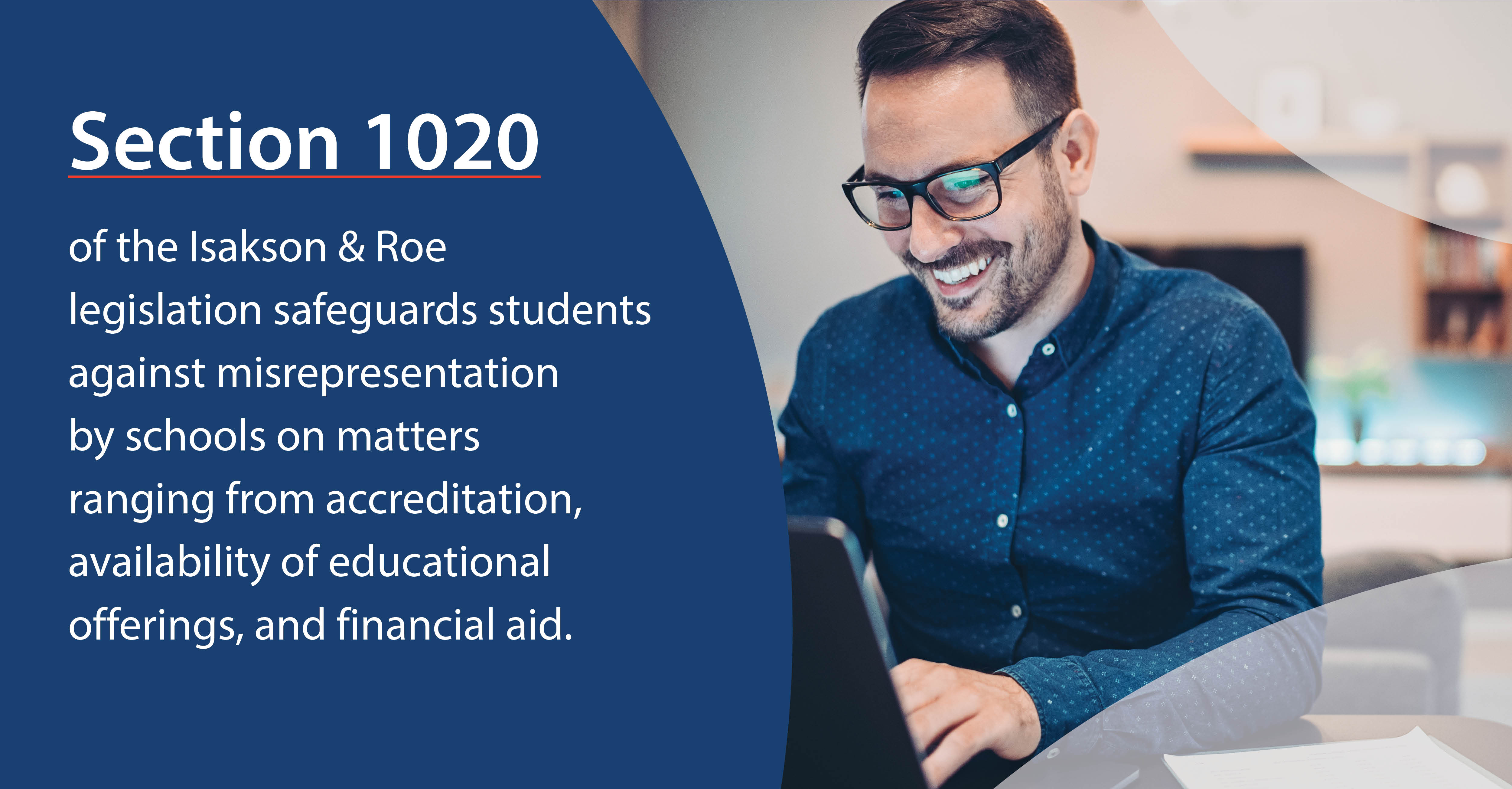
Limits the type of advertising, sales, and marketing that schools can undertake and remain eligible for GI Bill funds. This is to safeguard students against misrepresentation by schools on matters ranging from accreditation, availability of educational offerings, and financial aid.
Schools that do not comply will be penalized and placed in a process with SAAs and VA to come back into compliance.
Effective August 1, 2022
General Updates and Clarifications
Housing Allowance for Individuals Who Attend School While on Active Duty (Section 1009)
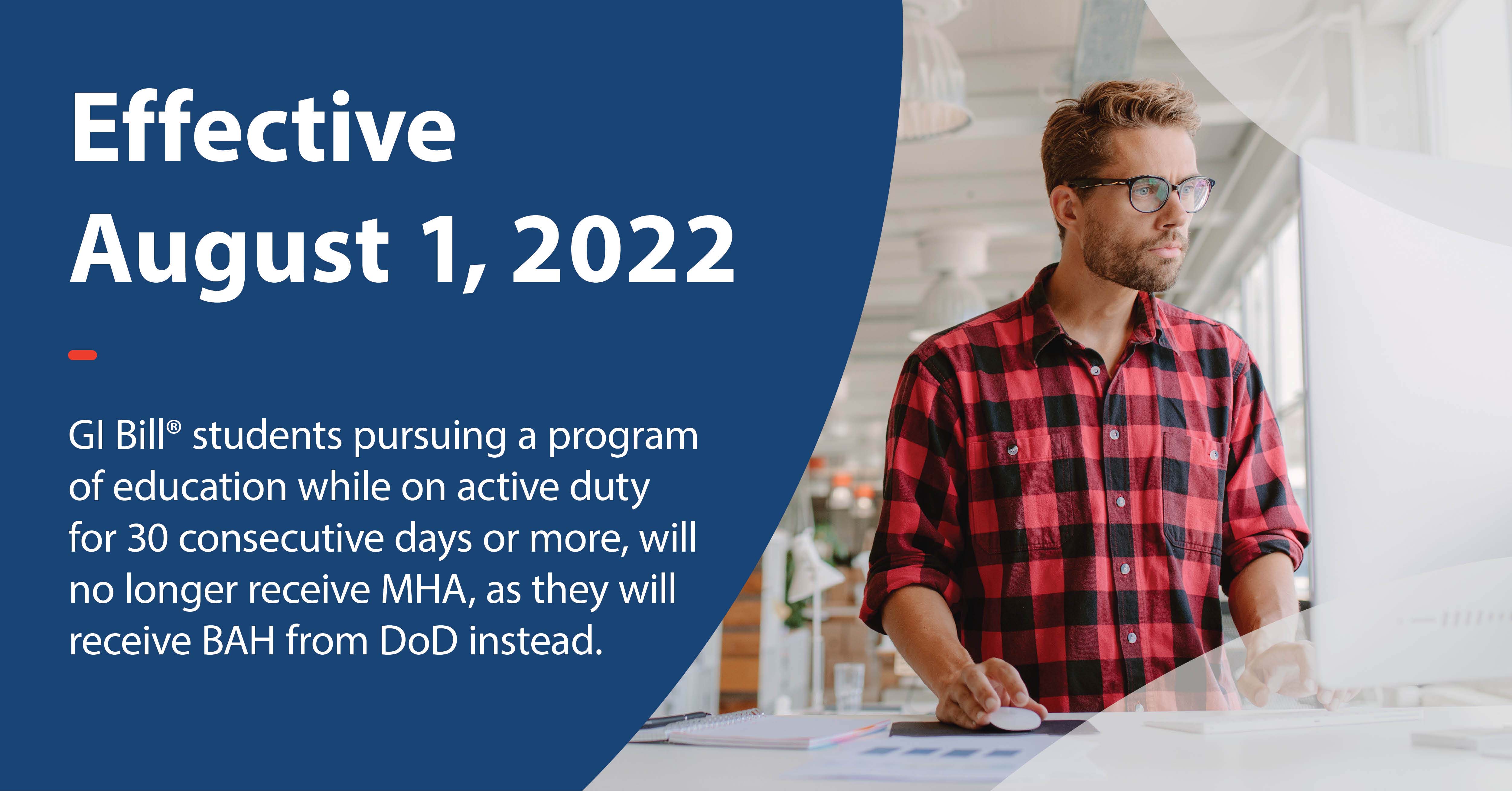
Students on active duty who serve at least 30 continuous days will no longer be eligible to receive an MHA through Post 9/11 GI Bill benefits, as they will receive a housing allowance through the Department of Defense. Effective: August 1, 2022.
Effective October 2022 and beyond:
Oversight of educational institutions with approved programs: risk-based surveys (Section 1013)
Requires the Secretary of Veteran Affairs to work with SAAs to develop a comprehensive program to conduct risk-based surveys. Effective: October 1, 2022
Period for election to receive benefits under All-Volunteer Educational Assistance Program, or Montgomery GI Bill (Section 1003)
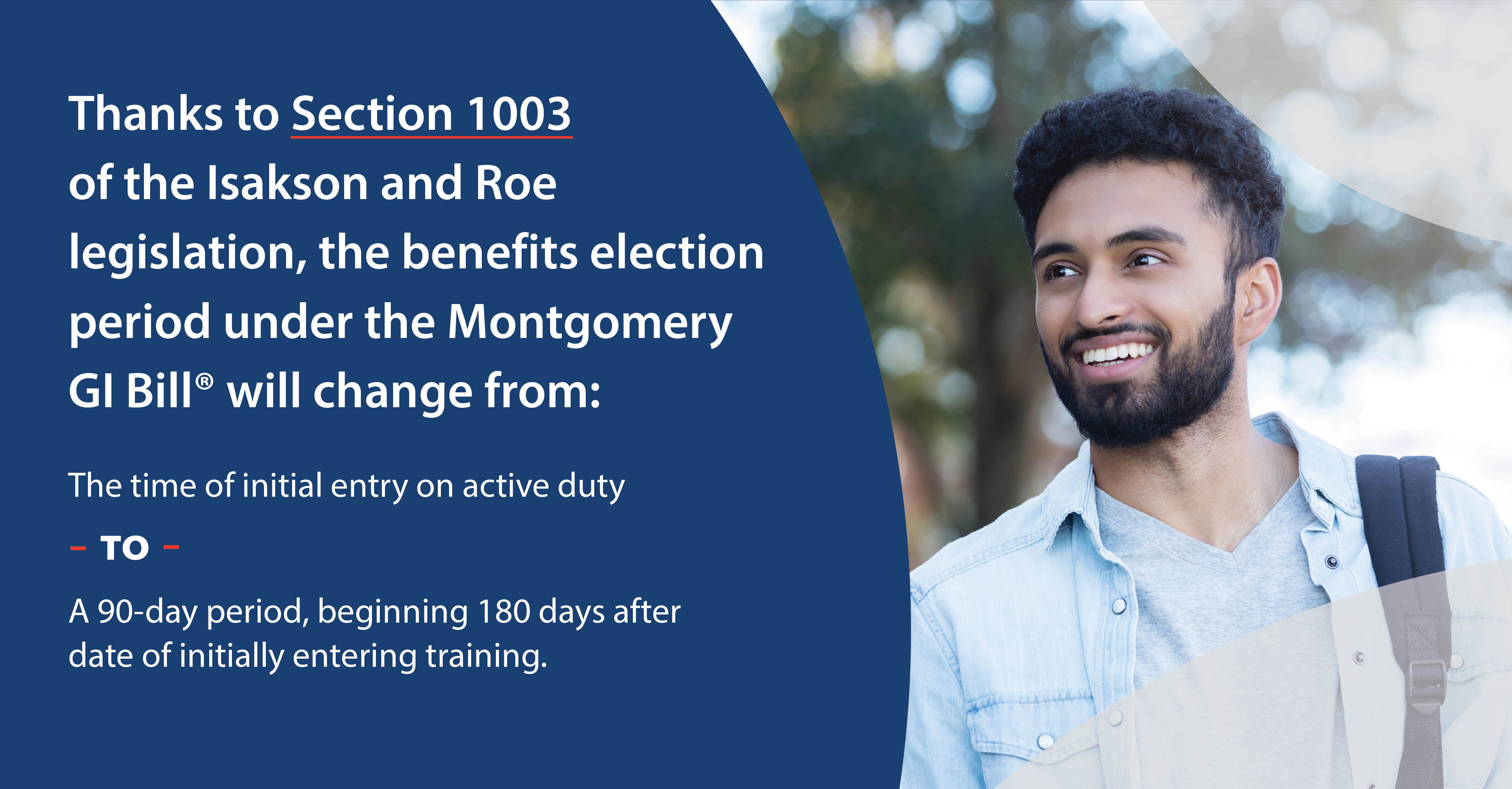
Changes the period for election to receive benefits under Montgomery GI Bill® (MGIB) from the time of initial entry on active duty to a 90-day period following 180 days after the date on which an individual entered initial training. Effective: January 5, 2023
Phase out of All-Volunteer Educational Assistance Program, or Montgomery GI Bill (Section 1004)
In September 2030, the All-Volunteer Educational Assistance Program (Montgomery GI Bill; MGIB) will be phased out. Those eligible for the program prior to September 30, 2030 would retain that eligibility until ten years after they leave service. Effective: September 30, 2030
REMOTE Act
Effective December 21, 2021
Waiver of verification of enrollment for certain educational institutions (Section 3a)
Schools are required to submit a second verification of enrollment “after the last date on which a student is able to withdraw from the course or program of education without penalty.” The Secretary has the authority to waive this requirement if the second verification is deemed unnecessary.
Limitation on Authority to Disapprove of Courses (Section 3b)
Schools can pay incentives to recruit foreign students not eligible for Federal financial student aid. This change creates consistency between GI Bill restrictions and those of the Department of Education applicable to Federal financial student aid.
All foreign schools no longer have to follow the requirements to exempt certain foreign students and foreign schools from certain reporting requirements.
This also exempts schools that provide their students with financial disclosure information required by the Secretary of Education (e.g., schools that provide students with a College Financial Plan as part of participation in Federal financial student aid) from any of the requirements of 38 U.S Code Section 3697, subsection f.
Any school seeking a waiver may apply for one as of June 15, 2022.
“Rounding out” the final semester, term or academic period of a student (Section 4)
If a student is taking all remaining classes required for graduation but those required classes are not enough to get the student to at least half-time status, the student is allowed to “round out.” The student is allowed to enroll in additional classes to be more than half-time and VA is authorized to pay benefits for the additional classes. This is only allowable during the student’s final semester, term or academic period.
Expired COVID-19 Protections
The following sections of the Isakson & Roe Act were introduced during the COVID-19 pandemic and are no longer applicable.
Continuation of educational assistance benefits during COVID-19 (Section 1102)
GI Bill students as well as VR&E beneficiaries may be eligible to receive their Monthly Housing Allowance (MHA) at their original rate for up to a total of four weeks if their school was negatively impacted by COVID-19 and took any of the following actions between March 1, 2020 and June 1, 2022.
- Closed (permanently or temporarily)
- Reduced the number of credit hours you could attend
- Shortened semesters periods
- Was delayed
- Relocated
- Converted to online training
- Disapproved or canceled a program
Effects of closure of educational institution and modification of courses (Section 1103)
GI Bill students who were enrolled full-time on March 1, 2020 will be able to maintain that status for a subsequent period of enrollment, regardless of their actual rate of pursuit, if their school closed (fully or partially) due to COVID-19.
GI Bill students are also allowed to continue in a program that was disapproved because it was modified due to COVID-19.
GI Bill entitlement and payment allowances will not be charged for up to a total of four weeks for the time a student’s payments are continued after their school closes or suspends operations due to COVID-19.
Payment of education benefits in cases of withdrawal due to COVID-19 (Section 1104)
Views a student’s withdrawal from school due to COVID-19 as a covered reason under mitigating circumstances.
Delimiting date extension due to COVID-19 (Section 1105)
Simplifies the extensions of time limits to use certain educational and VR&E benefits. The current limitation that the interruption must be due to a school closure (permanent or temporary) continues; however, the delimiting date will be extended for the entire COVID-19 period (March 1, 2020 – December 21, 2021 = 661 days) with the delimiting date period resuming on December 22, 2021. Effective: January 5, 2021.
Apprenticeship or On-the-job training (OJT) requirements during COVID-19 (Section 1106)
VA will pay MHA based on the maximum hours offered by a program if the OJT or apprenticeship program has reduced the number of hours offered to work due to COVID-19 AND the trainee is no longer able to fulfill the 120-hour requirement.
The rate of pursuit and MHA will be calculated based on the number of hours the trainee is offered to work. Additionally, trainees can now roll over any hours worked in excess of 120 from one month to the next. Note: This provision also applies to VR&E beneficiaries.
Inclusion of training establishments in certain provisions related to COVID-19 emergency (Section 1107)
Clarifies that earlier legislation (Public Laws 116-128 and 116-140) affording COVID-19 protections equally applies to students enrolled in “training establishments” (OJT and apprenticeship programs) in addition to “educational institutions.”
Treatment of payment of allowances under Student Veteran Coronavirus Response Act (Section 1108)
Amends the Student Veteran Coronavirus Response Act of 2020 to ensure that a student’s entitlement and payment allowances are not charged for the time the student’s payments are continued after the closure or program hiatus (4-week payments).




















